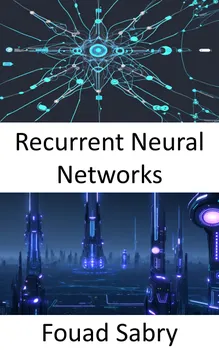What Is Recurrent Neural Networks
An artificial neural network that belongs to the class known as recurrent neural networks (RNNs) is one in which the connections between its nodes can form a cycle. This allows the output of some nodes to have an effect on subsequent input to the very same nodes. Because of this, it is able to display temporally dynamic behavior. RNNs are a descendant of feedforward neural networks and have the ability to use their internal state (memory) to process input sequences of varying lengths. Because of this, they are suitable for applications such as speech recognition and unsegmented, connected handwriting recognition. Theoretically, recurrent neural networks are considered to be Turing complete since they are able to execute arbitrary algorithms and interpret arbitrary sequences of inputs.
How You Will Benefit
(I) Insights, and validations about the following topics:
Chapter 1: Recurrent neural network
Chapter 2: Artificial neural network
Chapter 3: Backpropagation
Chapter 4: Long short-term memory
Chapter 5: Types of artificial neural networks
Chapter 6: Deep learning
Chapter 7: Vanishing gradient problem
Chapter 8: Bidirectional recurrent neural networks
Chapter 9: Gated recurrent unit
Chapter 10: Attention (machine learning)
(II) Answering the public top questions about recurrent neural networks.
(III) Real world examples for the usage of recurrent neural networks in many fields.
Who This Book Is For
Professionals, undergraduate and graduate students, enthusiasts, hobbyists, and those who want to go beyond basic knowledge or information for any kind of recurrent neural networks.
What Is Artificial Intelligence Series
The Artificial Intelligence book series provides comprehensive coverage in over 200 topics. Each ebook covers a specific Artificial Intelligence topic in depth, written by experts in the field. The series aims to give readers a thorough understanding of the concepts, techniques, history and applications of artificial intelligence. Topics covered include machine learning, deep learning, neural networks, computer vision, natural language processing, robotics, ethics and more. The ebooks are written for professionals, students, and anyone interested in learning about the latest developments in this rapidly advancing field.
The artificial intelligence book series provides an in-depth yet accessible exploration, from the fundamental concepts to the state-of-the-art research. With over 200 volumes, readers gain a thorough grounding in all aspects of Artificial Intelligence. The ebooks are designed to build knowledge systematically, with later volumes building on the foundations laid by earlier ones. This comprehensive series is an indispensable resource for anyone seeking to develop expertise in artificial intelligence.












